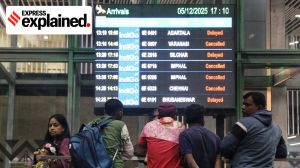UPSC Essentials: Daily Subject-wise quiz — Polity and Governance (Week 2)
Are you Prelims ready? The countdown for UPSC CSE 2023 has begun. Check your progress and revise your topics through following quiz on Indian polity and governance.
 Brush up your knowledge of Polity and Governance by solving the MCQs. (file image)
Brush up your knowledge of Polity and Governance by solving the MCQs. (file image) UPSC Essentials brings to you its new initiative of subject-wise quizzes. UPSC Daily Subject Quiz will cover all topics under UPSC Civil Services syllabus like Polity, History, Geography, Economics, Environment, Science and Technology, International Relations, and more. These quizzes are designed to help you revise some of the most important topics from the static part of the syllabus.
Each day, we will cover one new subject. Attempt today’s subject quiz on Polity and Governance to check your progress. Come back tomorrow to solve the MCQs on History, Culture and Social Issues. Don’t miss checking the answers and explanations at the end of the quiz.
QUESTION 1
Which of the following organisation releases World Press Freedom Index (WPFI)?
(a) Transparency International
(b) Reporters without Borders
(c) United Nations Human Rights Council
(d) International Federation of Journalists
QUESTION 2
Consider the following statement about the duties of Comptroller and Auditor General:
1. To audit all expenditure from the Consolidated Fund of India and of each State and of each Union territory having a Legislative Assembly.
2. To audit all transactions of the Union and of the States relating to Contingency Funds and Public Accounts.
3. To audit all trading, manufacturing, profit and loss accounts and balance-sheets and other subsidiary accounts kept in any department of the Union or of a State.
Select the correct answer using the codes given below:
(a) 1 and 3 only
(b) 2 only
(c) 1 and 2 only
(d) 1, 2 and 3
QUESTION 3
With reference to the Serious Fraud Investigation office (SFIO), consider the following
statements:
1. It is a multi-disciplinary organisation under the Ministry of Home Affairs.
2. The SFIO is headed by a Director in the rank of Joint Secretary to the Government of India as Head of the Department.
Select the correct answer using the codes given below:
(a) 1 only
(b) 2 only
(c) Both 1 and 2
(d) Neither 1 nor 2
QUESTION 4
With reference to the delimitation, consider the following statements:
1. It is the act of redrawing boundaries of only Lok Sabha seats to represent changes in population.
2. The main objective of delimitation is to provide equal representation to equal segments of a population.
3. The Delimitation Commission is appointed by the Prime Minister of India and works in collaboration with the Election Commission of India.
4. It comprises of a retired Supreme Court judge, the Chief Election Commissioner of India and respective State Election Commissioners.
Select the correct answer using the codes given below:
(a) 2 and 4 only
(b) 2, 3 and 4 only
(c) 1, 2 and 3 only
(d) 1, 2, 3 and 4
QUESTION 5
Which of the following statements is not correct about the speaker of the Lok Sabha?
(a) Speaker holds Office from the date of his/her election till immediately before the first meeting of the Lok Sabha after the dissolution of the one to which he/she was elected.
(b) He/She is eligible for re-election.
(c) On the dissolution of the Lok Sabha, although the Speaker ceases to be a member of the House, he/she does not vacate his/her Office.
(d) The Speaker may, at any time, resign from Office by writing under his/her hand to the President of India.
QUESTION 6
Consider the following statement about Committee On Public Undertakings:
1. The Committee on Public Undertakings is a Parliamentary Committee consisting of 22 members, fifteen of whom are elected by the Lok Sabha and seven are nominated from the Rajya Sabha.
2. The Chairman is appointed by the Speaker from amongst the Members of the Committee.
3. The term of the Committee does not exceed three years.
Select the correct answer using the codes given below:
(a) 1 and 3 only
(b) 2 and 3 only
(c) 1 and 2 only
(d) 1, 2 and 3
QUESTION 7
Which of the following statements is not correct about Members of Parliament Local Area
Development Scheme (MPLADS)?
(a) It is a central government scheme, under which MPs can recommend development programmes involving spending of Rs 5 crore every year in their respective constituencies.
(b) MPs only from Lok Sabha are eligible for this scheme.
(c) The government transfers it directly to the respective local authorities
(d) The scheme was launched in 1993.
QUESTION 8
Which of the following is/are the eligibility criteria to contest election to the office of President?
1. Must be a citizen of India.
2. Must have completed 30 years of age.
3. Must be eligible to become a member of Lok Sabha.
4. Should not be holding any office of profit under the Government of India.
Select the correct answer using the codes given below:
(a) 1, 2, 3 and 4
(b) 1, 2 and 4 only
(c) 2, 3 and 4 only
(d) 1, 3 and 4 only
ANSWERS TO MCQs
1. (b)
FYI:
— The purpose of the World Press Freedom Index is to compare the level of press freedom enjoyed by journalists and media in 180 countries and territories. The index is published by an non-profit organisation, Reporters without Borders.
— The Index’s rankings are based on a score ranging from 0 to 100 that is assigned to each country or territory, with 100 being the best possible score (the highest possible level of press freedom) and 0 the worst.
— The Central Government informed Parliament that it did not agree with the conclusions drawn by ‘Reporters Without Borders’ in the World Press Freedom Index that ranked India at 150 among 180 nations in its 2022 report.
— The report described India as “one of the world’s most dangerous countries for the media” and noted that “journalists are exposed to all kinds of physical violence, including police violence, ambushes by political activists and deadly reprisals by criminal groups or corrupt local officials.
Therefore, option (b) is the correct answer.
2. (d)
FYI:
— The Comptroller and Auditor General of India derives his authority and functions mainly from the provisions of Articles 149 to 151 of the Constitution of India.
— Article 149 of the Constitution provides that the Comptroller and Auditor General of India shall exercise such powers and perform such duties in relation to the accounts of the Union and of the States and of any other authority or body as may be prescribed by or under any law made by Parliament.
Duties of CAG
— To audit all expenditure from the Consolidated Fund of India and of each State and of each Union territory having a Legislative Assembly and to ascertain whether the moneys shown in the accounts as having been disbursed were legally available for and applicable to the service or purpose to which they have been applied or charged and whether the expenditure conforms to the authority which governs it. Hence, statement 1 is correct.
— To audit all transactions of the Union and of the States relating to Contingency Funds and Public Accounts. Hence, statement 2 is correct.
— To audit all trading, manufacturing, profit and loss accounts and balance-sheets and other subsidiary accounts kept in any department of the Union or of a State; and in each case to report on the expenditure, transactions or accounts so audited by him. Hence, statement 3 is correct.
Therefore, option (d) is the correct answer.
(Other Source: cag.gov.in)
3. (b)
FYI:
— As per the Companies Act, 2013, the Serious Fraud Investigation Office (SFIO) has been set up by the Government of India.
— It is a multi-disciplinary organisation under the Ministry of Corporate Affairs, comprising experts in the fields of accountancy, forensic auditing, banking, law, information technology, investigation, company law, capital markets and taxation etc. for detection and prosecution . Recommending prosecution of white-collar crimes/frauds. Hence, statement 1 is not correct.
— Investigation into the affairs of a company is entrusted to the SFIO where the Government is of the opinion that it is necessary to investigate into the affairs of the company:
(a) on receipt of the report of the Registrar or Inspector under section 208 of the Companies Act, 2013.
(b) On intimation of a special resolution passed by a company that its affairs are required to be examined
(c) in the public interest; or at the request of any department of the Central Government or a State Government
(d) The SFIO is headed by a Director in the rank of Joint Secretary to the Government of India as Head of the Department. The Director is assisted by Additional Directors, Joint Directors, Deputy Directors, Senior Assistant Directors, Assistant Directors Prosecutors and other secretarial staff. SFIO is headquartered in New Delhi with five regional offices at Mumbai, New Delhi, Chennai, Hyderabad and Kolkata. Hence, statement 2 is correct.
Therefore, option (b) is the correct answer.
(Other Source: sfio.gov.in)
4. (a)
FYI:
— Delimitation is the act of redrawing boundaries of Lok Sabha and state Assembly seats to represent changes in population. The main objective of delimitation is to provide equal representation to equal segments of a population.
— It is set up under Article 82, Parliament is to enact a Delimitation Act after every Census. Once the Act is in force, the Union government sets up the Delimitation Commission. The Delimitation Commission is appointed by the President of India and works in collaboration with the Election Commission of India.
— It is composed of a retired Supreme Court judge, the Chief Election Commissioner of India and respective State Election Commissioners.
— The Delimitation Commission works without any executive influence. The Constitution mandates that the Commission’s orders are final and cannot be questioned before any court as it would hold up an election indefinitely.
Therefore, option (a) is the correct answer.
5. (d)
FYI:
— In the Lok Sabha, the lower House of the Indian Parliament, both Presiding Officers – the Speaker and the Deputy Speaker are elected from among its members by a simple majority of members present and voting in the House.
— Speaker holds Office from the date of his/her election till immediately before the first meeting of the Lok Sabha after the dissolution of the one to which he/she was elected.
— He/She is eligible for re-election.
— The Speaker may, at any time, resign from Office by writing under his/her hand to the Deputy Speaker..
— On the dissolution of the Lok Sabha, although the Speaker ceases to be a member of the House, he/she does not vacate his/her Office.
Therefore, option (d) is the correct answer.
(Other Source: speakerloksabha.nic.in)
6. (c)
FYI:
— The Committee on Public Undertakings is a Parliamentary Committee consisting of 22 Members, fifteen of whom are elected by the Lok Sabha every year from amongst its Members according to the principle of proportional representation by means of a single transferable vote and seven Members to be nominated by Rajya Sabha for being associated with the Committee. Hence, statement 1 is correct.
— The Chairman is appointed by the Speaker from amongst the Members of the Committee. Hence, statement 2 is correct.
— A Minister is not eligible to become a Member of the Committee.
— If a Member after his election to the Committee is appointed a Minister, he ceases to be a Member of the Committee from the date of such appointment. The term of the Committee does not exceed one year. Hence, statement 3 is not correct.
Therefore, option (c) is the correct answer.
(Other Source: loksabha.nic.in)
7. (b)
FYI:
— MPLAD is a central government scheme, under which MPs can recommend development programmes involving spending of Rs 5 crore every year in their respective constituencies.
— MPs from both Lok Sabha and Rajya Sabha, including nominated ones, can do so.
— States have their version of this scheme with varying amounts per MLA. Delhi has the highest allocation under MLALAD, each MLA can recommend works for up to Rs 10 crore each year. In Punjab and Kerala, the amount is Rs 5 crore per MLA per year.
— MPs and MLAs do not receive any money under these schemes. The government transfers it directly to the respective local authorities.
— The legislators can only recommend works in their constituencies based on a set of guidelines. For the MPLAD Scheme, the guidelines focus on the creation of durable community assets like roads, school buildings etc.
Therefore, option (b) is the correct answer.
8. (d)
FYI:
— As per Article 55(3) of the Constitution of India, the election of the President shall be held in accordance with the system of proportional representation by means of single transferable vote and the voting at such election shall be by secret ballot.
— Under Article 58, a candidate should fulfil the following eligibility conditions to contest the election to the Office of President: –
1. Must be a citizen of India.
2. Must have completed 35 years of age.
3. Must be eligible to be a member of the Lok Sabha.
4. Should not be holding any office of profit under the Government of India or the Government of any State or under any local or other authority subject to the control of any of the said Governments.
— However, the candidate may be holding the office of President or Vice-President or Governor of any State or Ministers of the Union or any State and shall be eligible to contest election.
Therefore, option (d) is the correct answer.
(Other Source: eci.gov.in)
Previous Quizzes:
Polity and Governance
History, Culture, and Social Issues
UPSC Weekly Quiz (Current Affairs)
Environment, Geography, Science and Technology
International Relations
Tomorrow’s Quiz: Polity and Governance
(The UPSC Essentials Indian Express is now on Telegram. Click here to join our YouTube channel and stay updated with the latest updates.
Subscribe to The Indian Express UPSC Key and prepare for the Civil Services and other competitive examinations with cues on how to read and understand content from the most authoritative news source in India.
Note: Catch the UPSC Weekly Quiz every Saturday evening and brush up on your current affairs knowledge.)
UPSC Magazine

Read UPSC Magazine
- 01
- 02
- 03
- 04
- 05































